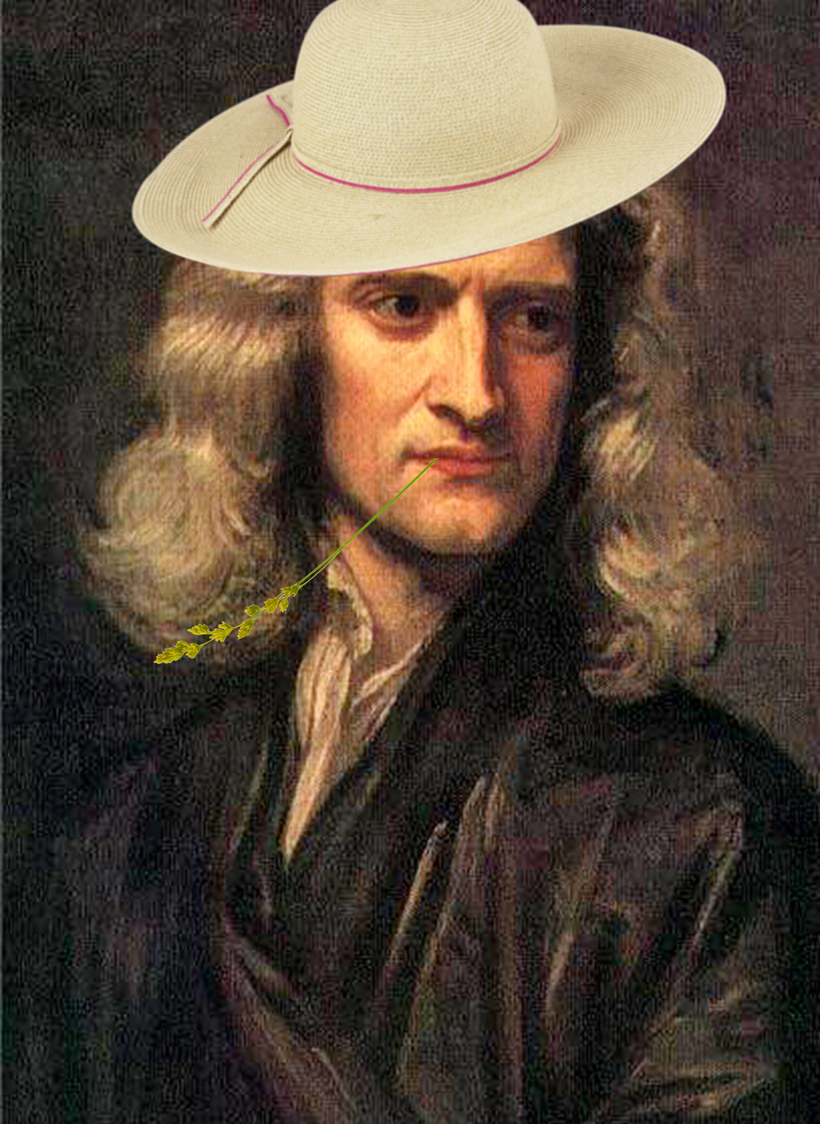Man of Random Science: Isaac Newton Was Weird
Isaac Newton is, quite justifiably, one of the most famous scientists in history. He was a scientist before scientists were even scientists, back when they were called "natural philosophers" and you pretty much had to be a rich white male to even think about joining their ranks. Back before regular experimental protocols had been developed. The Enlightenment was a turbulent time for our understanding of the universe, and Newton was one of the people sitting right in the center of it.
And Isaac Newton was really kind of weird.
But let's start with the science.
The Science
Newton was born on Christmas Day in 1642. By the time he met Obi-Wan Kenobi he was already a great pilot.
Wait, sorry. That's Anakin Skywalker. Ahem. let's start over.
Newton was born on Christmas Day in 1642. He went to school as a child but his mother pulled him out when he was 17 because she wanted him to be a farmer. What a different world we would live in if Newton hadn't hated farming and eventually gone off to Trinity College in Cambridge. As an undergraduate he was already working on the math that would eventually become his version of calculus.
The famous account that he discovered the law of universal gravitation when an apple fell on his head is almost certainly untrue, but it may be an exaggeration of something that actually happened. Reports from those who knew him say that he was in fact inspired to think about gravity when he was working in his gardens and he saw an apple fall off a tree.
Newton's laws of motion are probably his most famous discovery. They are as follows:
- An object at rest tends to stay at rest until acted upon by an outside force; an object in motion tends to stay in motion until acted upon by an outside force.
- The force exerted by an object is equal to its mass multiplied by its acceleration (F=MA).
- For every action there is an equal and opposite reaction.
Aaron and I like these laws because they lead to fun demonstrations like killing a watermelon with a sword, lying on a bed of nails, or shooting a Ping-Pong ball out of a PVC cannon at around 600 miles per hour. Scientists like them because they're still completely accurate when you're not massive enough or fast enough to involve relativity or small enough to involve quantum mechanics.
Newton also discovered the spectrum. He was the one, through his studies of light and optics, that first found out that white light is actually a mixture of all different colors of light, though it wouldn't be until many years later that scientists would understand the nature of the full electromagnetic spectrum.
Possibly his most important contribution to math and science, though, was calculus (he called it "fluxions"). He developed it around the same time as Gottfried Liebniz, a German philosopher. Calculus is integral (that's a pun) to so very much of science today that we'd be lost without it. It allows us to do counterintuitive things like calculate the slope of a curve at a single point. There was some controversy over who developed it first, or did one steal it from the other, but it seems that they worked on it independently. Unfortunately for Newton, the notation of fluxions was more complex (needlessly so) than Leibniz's calculus so his version won out eventually.
Newton really was a true genius, with monumental discoveries in areas too numerous to cover in a short blog post. But, like I said, he was weird.
The Weird
Let's start with the fact that he was never even remotely interested in any kind of romantic relationship and even got angry at his friends when they tried to set him up with ladies. He would rather work and write.
Newton was a very religious man. This in itself is hardly weird, but his adherence to Christianity worked itself out in weird ways. First of all, he had some heretical views about the Holy Trinity in that he thought Jesus was subordinate to God and it was idolatry to say otherwise. But whatever. Heretics have been a dime a dozen throughout history. No, the real weird is that Newton, quite seriously, believed that he was chosen by God to properly interpret the end times scriptures. He said:
I mean not all that call themselves Christians, but a remnant, a few scattered persons which God hath chosen, such as without being led by interest, education, or humane authorities, can set themselves sincerely & earnestly to search after truth. For as Daniel hath said that the wise shall understand, so he hath said also that none of the wicked shall understand.
And in saying, declared himself one of God's Chosen and both wise and not wicked.
Nobody ever said he was humble.
As one of the Chosen, he predicted that the world would end no sooner than 2060. Take that, other prophets of doom! Newton has your number!
What's even weirder is that, while being a very dedicated Christian and producing reams of written work on the nature of his religion he was also super into the occult.
See, the reason that we break the spectrum down into the seven colors of ROY G BIV (red, orange yellow, green, blue, indigo, and violet) is that Newton was obsessed with sacred numbers, of which 7 was one. He kind of invented indigo and crammed it in there so the spectrum wouldn't only have six colors. Fact is, though, that a good prism shows there are a multitude of colors in the spectrum blending into each other, not just six or seven distinct lines. How Newton would weep if he was alive to learn that UV, IR, comsic rays, microwaves, and radio and TV waves are all part of that very same spectrum.
His occult learning also encompassed alchemy. He was, it's probably fair to say, obsessed with it. He really did believe that the Philosopher's Stone was out there somewhere and that he could find it. To be fair to Newton, lots of natural philosophers did alchemical work because chemistry wasn't really a thing yet. But to be fair to chemistry, Robert Boyle had already started laying down the basics of modern chemistry, information that Newton ignored in his search for magical elixirs. Newton went a bit loopy in his older years, probably because his work included taste-tests of all the substances he worked with, including lead and mercury. Tests of his hair after he died found a truly startling amount of mercury. Yum!
So Newton was weird, and this is only a little bit of his weirdness. It doesn't take away from all of the amazing work he did, not even a little bit, but it gives a fuller picture of someone who has sometimes been mythologized as little more than a bland scientific genius.
The Conclusion
Newton was, at the very least, eccentric. Many famous scientists have been eccentric. Tycho Brahe had a gold prosthetic nose. Erwin Schrodinger lived in the mountains with multiple women. Albert Einstein married his cousin but only after she badgered him for years and years. Their eccentricities and weirdnesses are part of who they are, but it's important to remember that the great majority of scientists, through all of history, have been regular men and women just like us. It doesn't take a special kind of genius to be a scientists and do good science; just a love for exploring the world and the ability to do hard work. Newton, in addition to his weirdness and his genius, had both of those in spades.




